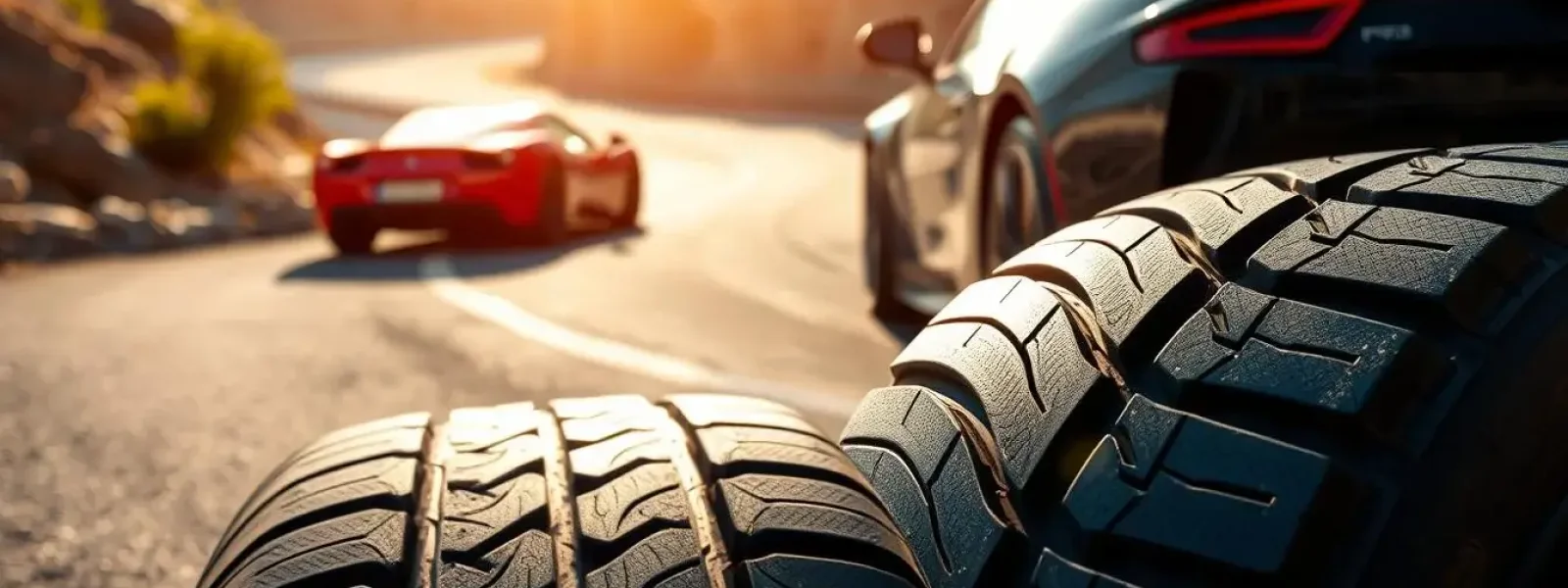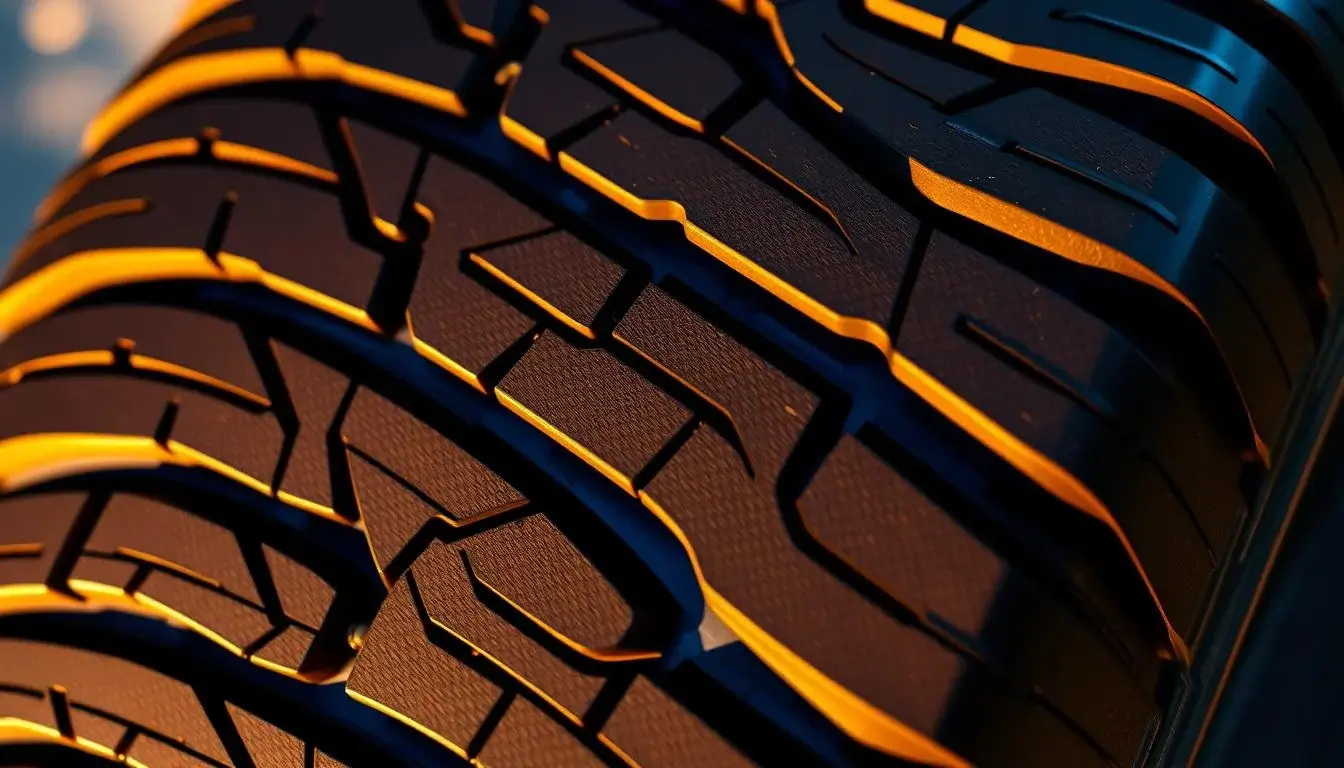Have you ever felt the thrill of driving on a warm, sunny day, only to notice your car doesn’t respond as sharply as you’d like? The right set of tires can make all the difference. Summer tires are specifically crafted to enhance your driving experience when the temperature rises.
These tires feature unique rubber compounds and tread patterns designed to provide exceptional grip on dry roads. They also maintain reliable traction in wet conditions, ensuring safety and control. Whether you’re navigating city streets or hitting the open road, the summer tires improve performance and can transform your drive.
Unlike all-season options, summer tires are engineered for peak performance in warm climates. Their design focuses on better braking, cornering, and overall handling. If you’re looking to elevate your driving experience, understanding the benefits of these tires is a great place to start.
Key Takeaways
- Summer tires are designed for optimal performance in warm weather.
- Unique rubber compounds enhance grip on dry and wet roads.
- Special tread patterns improve handling and braking.
- They outperform all-season tires in warm conditions.
- Choosing the right tires can enhance safety and driving pleasure.
Understanding Summer Tires vs All-Season Tires
When it comes to choosing the right tires, understanding the differences between summer and all-season options is key. Each type is designed for specific driving conditions, and knowing their strengths can help you make an informed decision.
Design and Tread Pattern Differences
Summer tires are built with a specialized rubber compound that stays flexible in warm weather, providing better grip on dry and wet roads. Their tread patterns feature fewer grooves, maximizing road contact for enhanced handling.
All-season tires, on the other hand, have deeper grooves and sipes to handle a variety of conditions, including light snow. This design balances performance but may not excel in extreme heat or cold.
Performance in Varied Weather Conditions
In warm climates, summer tires outperform all-season options with superior traction and braking. They also resist hydroplaning in wet conditions, thanks to their unique tread design.
All-season tires offer moderate performance across different weather conditions, making them a versatile choice for drivers in areas with mild winters.
Longevity and Ride Comfort Considerations
Summer tires may wear faster due to their softer compound and shallower tread. However, they provide a smoother, more responsive ride in warm weather.
All-season tires tend to last longer but may sacrifice some comfort and handling precision. Their symmetrical design allows for easier rotation, extending their lifespan.
Choosing between these two depends on your climate and driving style. For warm regions, summer tires are ideal, while all-season tires suit areas with varied weather.
Summer Tires Improve Performance: Key Advantages
Driving enthusiasts often seek that perfect balance of control and responsiveness on the road. Summer tires are designed to deliver just that, offering distinct advantages in warm weather conditions. Their unique features make them a top choice for those who prioritize precision and safety.
Enhanced Dry Road Grip and Handling
When the sun is shining, and the pavement is warm, these tires excel. Their specialized rubber compound ensures maximum contact with the road, providing exceptional grip. This translates to sharper braking and more precise cornering, giving you confidence behind the wheel.
The tread pattern is optimized for dry conditions, with fewer grooves to increase surface area. This design enhances stability and control, making every drive smoother and more enjoyable.
Improved Wet Traction and Hydroplaning Resistance
Even in wet conditions, these tires perform admirably. Their tread design includes water evacuation channels that quickly disperse moisture. This reduces the risk of hydroplaning, ensuring your vehicle stays firmly planted on the road.
The unique compound remains flexible, even when temperatures drop slightly. This flexibility helps maintain traction, providing a safer driving experience in unpredictable weather.
Optimized Tread Compound for High Temperatures
One of the standout features is their ability to handle heat. The rubber compound is engineered to stay flexible in high temperatures, ensuring consistent performance. This makes them ideal for sports cars and high-performance vehicles that demand reliability.
Whether you’re accelerating on a straightaway or navigating tight corners, these tires deliver. Their design ensures durability and responsiveness, even under intense driving conditions.
By choosing the right tires, you can elevate your driving experience to new heights. Their advanced features ensure you stay in control, no matter the conditions.
🚗 Upgrade Your Car’s Performance with the Best Summer Tires – Fast & Easy!
Now that you understand how summer tires improve performance and deliver exceptional handling, it’s time to make the switch! Amazon offers a wide range of high-performance summer tires at great prices, along with the convenience of professional installation services near you.
✅ Find the perfect set, compare top brands, and schedule installation—all in one place!
🔗 Shop Summer Tires + Installation on Amazon
Optimizing Your Driving Experience in Hot Climates
Hot climates demand tires that can handle extreme heat without compromising safety. When temperatures soar, your vehicle relies on its tires to maintain grip, stability, and control. Choosing the right set can make all the difference in ensuring a smooth and safe ride.
Heat Resistance and Tire Durability
High temperatures can cause tires to wear faster and lose pressure, affecting their performance. Heat-resistant tires are designed with advanced rubber compounds that dissipate heat effectively. This keeps them flexible and durable, even in punishing conditions.
These compounds also reduce the risk of blowouts and extend the tire’s lifespan. For example, brands like Bridgestone use innovative technologies to ensure their tires perform consistently in extreme heat. Regular maintenance, such as checking tire pressure, is essential to keep them in top shape.
Maximizing Speed and Cornering Precision
In hot climates, tires need to deliver both speed and precision. The unique tread patterns of heat-resistant tires maximize road contact, enhancing acceleration and braking. This is especially important for sports cars and high-performance vehicles.
These tires also provide better cornering stability, allowing you to navigate tight turns with confidence. Whether you’re on a winding road or a straight track, they ensure your vehicle responds quickly and smoothly.
For expert advice on selecting the right tires, visit local shops like RNR Tire Express in Corpus Christi, TX. They can help you find the perfect match for your driving needs and climate conditions.
☀️ Maximize Your Driving Experience – Get Your Summer Tires Installed Today!
Whether you’re looking for better cornering, shorter braking distances, or enhanced stability, the right set of summer tires can transform your driving experience. Amazon makes it simple to order your new tires and even helps you schedule professional installation in your area.
🔥 Don’t wait—get your summer tires delivered and installed today!
🔗 Find the Best Summer Tires & Get Them Installed on Amazon
Conclusion
When the heat rises, your vehicle deserves the best grip and control on the road. Summer tires are designed to deliver unmatched handling and safety in warm climates. Their specialized rubber compounds and tread patterns ensure superior traction on both dry and wet surfaces.
Unlike all-season tires, which offer balanced performance, summer tires excel in high-temperature conditions. They provide sharper braking, precise cornering, and enhanced stability, making them ideal for performance-driven drivers.
Choosing the right tire depends on your driving needs and local weather. For those in warm regions, summer tires are a clear winner. Always consider professional advice to ensure your vehicle is equipped for the road ahead.
With their advanced design and heat-resistant features, these tires elevate your driving experience, ensuring confidence and control in every mile.
🚗 Looking for a complete guide on summer tires? Discover everything about summer tire benefits, maintenance tips, and expert recommendations in our in-depth guide:
🔗 Everything You Need to Know About Summer Tires: A Powerful & Reliable Summer Tires Guide in 2025
FAQ
What makes summer tires different from all-season options?
Summer tires are crafted with a special rubber compound and continuous ribs that provide precise handling and grip the road better in warmer temperatures. Unlike all-season tires, which are designed for snow and ice, summer tires perform well on wet and dry roads, offering superior braking performance and steering response.
Can I use summer tires in winter or cold climates?
No, summer tires are not suitable for winter driving. Their softer rubber hardens when temperatures dip, reducing stopping distances and making them unsafe on sleet and ice. If you live in an area with snow or freezing temperatures, it is advisable to use a set of winter tires instead.
How do summer tires improve wet traction?
Summer tires feature directional tread patterns and grooves that expel water, reducing the risk of hydroplaning. Even in an infrequent downpour, these tires provide excellent control and delivers exceptional stability on wet and dry roads.
Do summer tires wear out faster than all-season tires?
Yes, because summer tires are designed for high-performance, they wear out faster than all-season tires. Their tread life depends on factors like tire rotation, driving habits, and road conditions. Regular maintenance, including checking tire size and pressure, can help you get the most mileage out of them.
Are summer tires a great choice for performance vehicles?
Absolutely! High-performance tires, such as Michelin Pilot Sport 4S and Bridgestone Potenza, are designed for precise handling and shorter stopping distances. They provide superior grip and ride quality, making them ideal for sports cars and performance tires enthusiasts.
How often should I replace summer tires?
A new set of summer tires typically lasts 3-5 years, depending on driving conditions. Regular tire rotation and avoiding excessive speeds can extend their tread life. If your tires lack heat resistance or show signs of uneven wear, consider replacing them sooner.
Are summer tires fuel-efficient?
Yes, low-profile summer tires have low rolling resistance, which can improve fuel economy. Their ability to grip the road efficiently reduces energy loss, especially during summer months when warmer temperatures impact mileage.
Should I buy summer tires or stick with all-season tires?
What’s best for your car depends on your location and driving style. If you drive in areas with mild winters and want great summer tires for warmer temperatures, then summer tires are purpose-built for superior performance. If you experience snow or freezing temperatures, then a set of winter tires or all-season tires would be a safer option.


